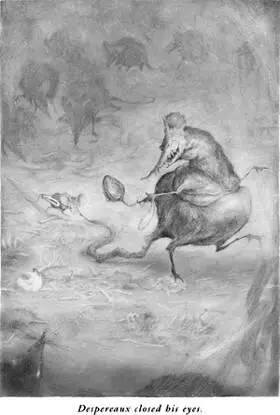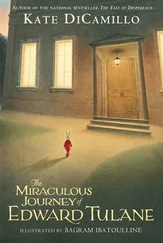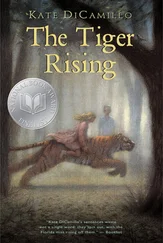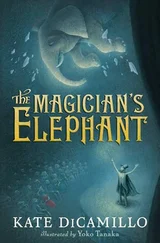“Yes,” said Despereaux. He took a step to the left of Botticelli.
“How inspiring,” said Botticelli. He lazily took a step to his right, blocking Despereaux’s way. “Why the hurry, little friend?”
“Because,” said Despereaux, “I have to —”
“Yes. Yes. You have to save the princess. Exactly. But before you save her, you must find her. Correct?”
“Yes,” said Despereaux.
“What if,” said Botticelli, “what if I told you that I know exactly where the princess is? What if I told you that I could take you right directly to her?”
“Ummm,” said Despereaux. His voice shook. His paw on the needle trembled. “Why would you do that?”
“Why would I do that? Why would I help you? Why . . . to be of service. To do my part for humanity. To aid in the saving of a princess.”
“But you are a . . .”
“A rat,” supplied Botticelli. “Yes. I am a rat. And I see by your trem-trem-trembling that the greatly exaggerated rumors of our evil nature have reached your oversize ears.”
“Yes,” said Despereaux.
“If,” said Botticelli, swinging the locket back and forth, “if you allow me to be of assistance, you will be doing me a tremendous favor. Not only can I do a good deed for you and for the princess, but my actions will help to dispel this terrible myth of evil that seems to surround rats everywhere. Will you let me assist you? Will you let me assist myself and my kind?”
Reader, was it a trick?
Of course it was!
Botticelli did not want to be of service. Far from it. You know what Botticelli wanted. He wanted others to suffer. Specifically, he wanted this small mouse to suffer. How best to do that?
Why, take him right directly to what he wanted. The princess. Let him see what his heart desired, and then, and only then, faced with what he loved, would Despereaux die. And at the end of it all, how tasty the mouse would be . . . seasoned with hope and tears and flour and oil and thwarted love!
“My name, little friend, is Botticelli Remorso. And you may trust me. You must trust me. Will you tell me your name?”
“Despereaux. Despereaux Tilling.”
“Despereaux Tilling, take your paw from your weapon. Come with me.”
Despereaux stared at him.
“Come, come,” said Botticelli, “let go of your needle. Take hold of my tail. I will lead you to your princess. I promise.”
What, reader, in your experience is the promise of a rat worth?
That’s right.
Zero. Zip. Nada. Goose eggs.
But I must ask you this question, too. What else was there for Despereaux to hold on to?
You are right again.
Nothing.
And so the mouse reached out. He took hold of the rat’s tail.

HAVE YOU EVER had hold of the tail of a rat? At best, it is an unpleasant sensation, scaly and cold, similar to holding on to a small, narrow snake. At worst, when you are dependent upon a rat for your survival, and when a part of you is certain that you are being led nowhere except to your death, it is a hideous sensation, indeed, to have nothing but a rat’s tail to cling to.
Nonetheless, Despereaux held on to Botticelli Remorso. And the rat led him deeper and deeper into the dungeon.
Despereaux’s eyes had, by this point, adjusted quite well to the darkness, though it would have been better if they had not, for the things he saw made him shiver and shake.
What did he see?
He saw that the floor of the dungeon was littered with tufts of fur, knots of red thread, and the skeletons of mice. Everywhere there were tiny white bones glowing in the darkness. And he saw, in the dungeon tunnels through which Botticelli led him, the bones of human beings, too, grinning skulls and delicate finger bones, rising up out of the darkness and pointing toward some truth best left unspoken.
Despereaux closed his eyes.
But it didn’t help. He saw as if his eyes were still open wide the bones, the tufts of hair, the knots of thread, the despair.
“Ha-ha, exactly!” Botticelli laughed as he negotiated the twists and turns. “Oh, yes, exactly.”
If what was in front of Despereaux was too horrible to contemplate, what followed behind him was, perhaps, even worse: rats, a happy, hungry, vengeful parade of rats, their noses up in the air, sniffing, sniffing.

“Mouse!” sang out one rat joyfully.
“Yes, oh, yes, mouse,” agreed another. “But something else, too.”
“Soup!” called out another rat.
“Yes, soup,” the others agreed.
“Blood!” sang a rat.
“Blood,” they all agreed together.
And then they sang: “Here, mousie, mousie, mousie! Here, little mousie!”
Botticelli called out to the other rats. “Mine,” he said. “This little treasure is all mine, gentlemen and ladies. Please, I beg you. Do not infringe on my discovery.”
“Mr. Remorso,” said Despereaux. He turned and looked behind him and saw the rats, their red eyes and their smiling mouths. He closed his eyes again. He kept them closed. “Mr. Remorso!” he shouted.
“Yes?” said Botticelli.
“Mr. Remorso,” said Despereaux. And he was crying now. He couldn’t help it. “Please. The princess.”
“Tears!” shouted the rats. “We smell tears, mousie, we do.”
“Please!” shouted Despereaux.
“Little friend,” said Botticelli. “Little Despereaux Tilling. I promised you. And I will keep that promise.”
The rat stopped.
“Look ahead of you,” he said. “What do you see?”
Despereaux opened his eyes.
“Light,” he said.
“Exactly,” said Botticelli. “Light.”

AGAIN, READER, we must go backward, before we go forward. We must consider, for a moment, what had occurred with the rat and the serving girl and the princess down in the dungeon before Despereaux made his way to them.
What happened was this: Roscuro led the Pea and Mig deep into the dungeon to a hidden chamber, and there he directed Mig to put the princess in chains.
“Gor,” said Mig, “she’s going to have a hard time learning her lessons if she’s all chained up-like.”
“Do as I say,” said Roscuro.
“Maybe,” said Mig, “before I lock her up, her and me could switch outfits, so we could start in already with her being me and me being a princess.”
“Oh, yes,” said Roscuro. “Certainly. A wonderful idea, Miss Miggery. Princess, take off your crown and give it to the serving girl.”
The Pea sighed and took off her crown and handed it to Mig, and Mig put it on and it slid immediately right down her small head and came to rest, quite painfully, on her poor, abused ears. “It’s a biggish thing,” she said, “and painful-like.”
“Well, well,” said Roscuro.
“How do I look?” Mig asked, smiling at him.
“Ridiculous,” he said. “Laughable.”
Mig stood, blinking back tears. “You mean I don’t look like a princess?” she said to the rat.
“I mean,” said Roscuro, “you will never look like a princess, no matter how big a crown you put on your tiny head. You look exactly like the fool you are and always will be. Now, make yourself useful and chain the princess up. Dress-up time is over.”
Mig sniffed and wiped at her eyes and then bent to look at the pile of chains and locks on the floor.
Читать дальше















